As one of the marijuana industry's biggest multinational operators, Tilray Brands (TLRY 2.63%) is a complicated company. It's engaged in multiple lines of business from cannabis to beer, and its cultivation facilities and retail outlets are spread across the world to take advantage of different regulatory and tax regimes. And to top it off, over the last year its shares have fallen by a face-melting 81.2%, which complicates the question of whether to invest, to say the least.
Moving forward, the company faces a new mix of headwinds and tailwinds that make it unlikely to retread its past trajectory. Let's examine three of the most important factors that smart investors are aware of so that you'll have the information you need to decide whether it's a good idea to sell your shares or whether it might be more favorable to pick up a few more.

NASDAQ: TLRY
Key Data Points
1. It's battling smaller regional competitors in Canada
Tilray's main focus is the Canadian recreational cannabis market, where its portfolio of brands have widespread distribution and strong positioning in multiple product and value segments. And while it's a leader in its home market, it isn't as dominant as it once was. Thanks to scrappy and often privately held marijuana companies, it's experiencing pressure to chop prices to remain competitive.
Getting less money per sale is bad news for a business that spent most of last year being unprofitable. As experienced investors know, price wars drive margins down, and Tilray's gross margin is already starting to compress. But it's launching new products that could fight that trend, like its recently announced high-potency hash-infused pre-rolled joints from its Good Supply brand. Furthermore, it remains to be seen whether acquisitions of the problematic small competitors might be another way to address the issue.
2. It could benefit big from cannabis legalization in Germany
Smart investors recognize that marijuana legalization isn't just an American issue. Via its CC Pharma subsidiary, Tilray holds the number-one spot in the German medicinal cannabis market, which management predicts will be worth as much as $1.3 billion by 2025. And now that regulatory authorities in Germany are explicitly endorsing legalization and strongly signaling that recreational cannabis could be legalized before the end of 2022, the business is ready to cash in.
What's more, Tilray has major cultivation facilities already installed in Germany as well as Portugal, both of which will give it tariff-free access to the newly opened market. That'll support wider margins, and it'll also help to justify its widely distributed operations more generally.
3. Inflation and economic disruption are serious threats
Wise investors recognize that inflation is affecting consumer choices everywhere, especially when it comes to products like cannabis that are traditionally purchased with disposable income. To complicate matters further, Tilray isn't exposed to the impact of inflation in just one country or one of its product segments, but many. As input costs rise, the company's margins will be squeezed, and it's possible that demand will fall for its recreational cannabis goods, hemp food products, and craft beer. That would likely exacerbate its troubles in Canada, as it's already struggling with getting undercut.
Plus, consumer inflation in the E.U. might affect consumers differently than in Canada or the U.S., so it's difficult for management to plan around in advance. Likewise, there's no guarantee that all of the economies where it competes will enter recessions, but it's a strong possibility. If a recession does come, once again consumer demand for cannabis may be on the chopping block.
This is where Tilray's extensive global footprint starts to look unwieldy. Keeping up with and reacting to the cannabis laws and shifting macroeconomic conditions of one country is complicated enough over the last couple of years, and now the company's leaders have a hearty handful of different situations to track and address. Depending on how things pan out, it's possible that its resources will be stretched too thin to capitalize on any opportunities that emerge.





